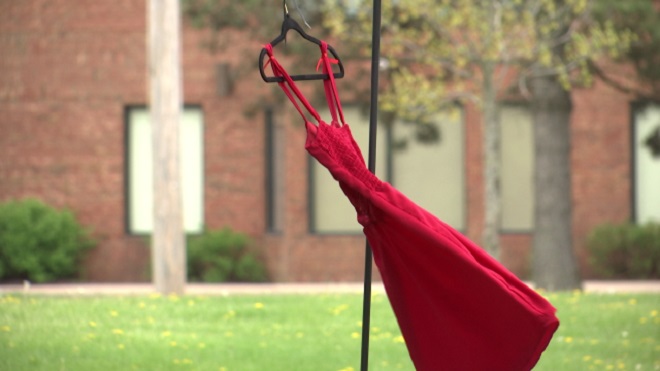OKEMOS, Mich. — As Red Dress Day approaches, activists are rallying to raise awareness about the ongoing crisis of missing and murdered Indigenous women. The observance, also known as Missing and Murdered Indigenous Women Day, shines a spotlight on the alarming rates of violence and disappearances affecting Native women and girls across the country, including in Michigan.
Red Dress Day, held annually on May 5, calls attention to the disproportionate levels of violence experienced by Indigenous women. The event aims to honor those who have gone missing or been murdered, while demanding justice and accountability for these often-overlooked cases. Activists say that the issue is not only a matter of personal loss but also a systemic crisis rooted in historical, social, and economic factors.
Nichole Keway Biber, a Tribal Citizen of the Little Traverse Bay Bands of Odawa, is one of the outspoken voices leading the charge to address the violence. Biber, who has dedicated herself to fighting for Indigenous women’s rights, believes the public’s understanding of the issue is crucial. “Red is the color in our teachings that is most recognizable by the spirit,” she said. “It connects us with the spirits of those who’ve passed on, and it helps raise awareness of the women and girls who go missing.”
Biber points to the role of corporations, particularly oil companies, in exacerbating the vulnerability of Indigenous women. She explains that large-scale projects, such as the construction and expansion of pipelines, bring a surge of temporary workers to rural areas, creating an environment ripe for exploitation. These workers, often housed in “man camps,” increase the risk of sexual violence, human trafficking, and other forms of abuse.
“When these oil companies set up man camps near our communities, it puts Indigenous women in a very vulnerable position,” Biber said. “There’s not enough law enforcement presence to protect our women. We see a direct connection between these pipeline projects and the disappearance of our people.”
According to Biber, these camps not only bring external threats but also disrupt local economies and communities, leading to further marginalization of Indigenous peoples. In the case of past pipeline projects, Biber describes instances of human trafficking and environmental damage. “These projects are often accompanied by violence. In some cases, breaches in the aquifer occurred, and water sources were contaminated,” she explained.
A study published in the Northwestern University Law Review supports Biber’s claims, finding that construction projects like pipelines increase the incidence of sexual violence in Indigenous communities, compounding the already high rates of abuse faced by Native women. The study also pointed to the lack of resources and support for law enforcement to investigate these cases properly, contributing to a widespread pattern of under-reporting and under-investigation of missing Indigenous women.
In Michigan, statistics from the Michigan Department of Health and Human Services show that cases of missing and murdered Indigenous women are frequently neglected, with many going unsolved. These under-reported incidents highlight the systemic failures that Indigenous communities face when seeking justice and protection.
Red Dress Day offers a platform to raise awareness about these issues, providing a space for remembrance and solidarity. On this day, advocates wear red dresses as a symbol of the missing and murdered women who have been taken too soon. For Biber and others, the day is about more than remembrance—it’s a call to action for increased protection, accountability, and justice for Indigenous women.
“The awareness we need is immense,” Biber said. “We want people to know how widespread this problem is and how critical it is to address it. Red Dress Day is a moment to honor our relatives who have been lost and to continue fighting for those who are still here.”
As the crisis continues, Indigenous communities and their allies are urging lawmakers, corporations, and law enforcement to take more immediate and meaningful action to address the root causes of this violence and ensure that missing Indigenous women are never forgotten. Red Dress Day serves as a reminder of the ongoing struggle for justice and the fight to protect vulnerable Indigenous women from harm.












